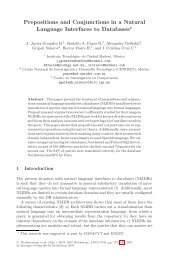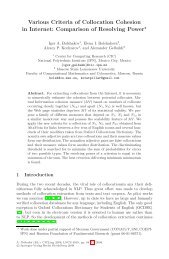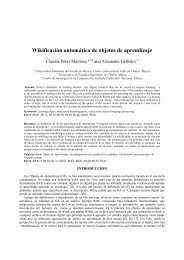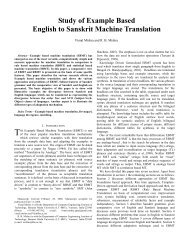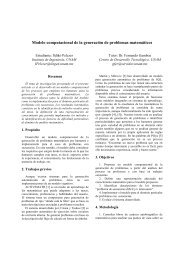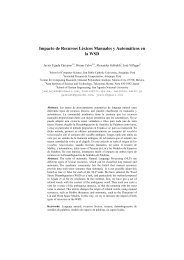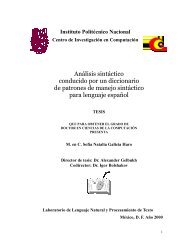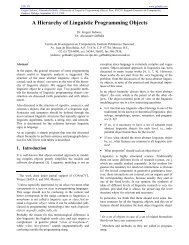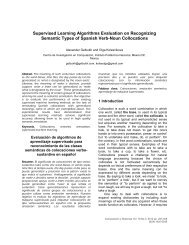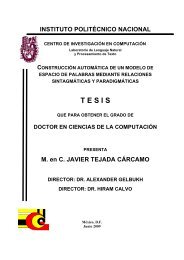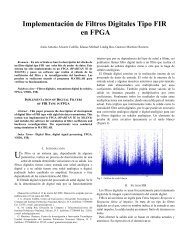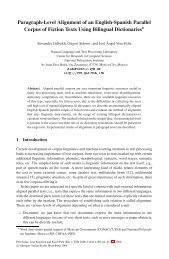Advances in Artificial Intelligence Theory - MICAI - Mexican ...
Advances in Artificial Intelligence Theory - MICAI - Mexican ...
Advances in Artificial Intelligence Theory - MICAI - Mexican ...
Create successful ePaper yourself
Turn your PDF publications into a flip-book with our unique Google optimized e-Paper software.
Genetic Algorithms for Dynamic Variable<br />
Order<strong>in</strong>g <strong>in</strong> Constra<strong>in</strong>t Satisfaction Problems<br />
H. Terashima-Marín, R. de la Calleja-Manzanedo, and M. Valenzuela-Rendón<br />
Center for Intelligent Systems, Tecnológico de Monterrey<br />
Ave. Eugenio Garza Sada 2501 Sur, Monterrey, Nuevo León 64849 Mexico<br />
{terashima@itesm.mx,rlight renecm@hotmail.com,valenzuela@itesm.mx}<br />
Abstract A Constra<strong>in</strong>t Satisfaction Problem (CSP) can be stated as<br />
follows: we are given a set of variables, a f<strong>in</strong>ite and discrete doma<strong>in</strong> for<br />
each variable, and a set of constra<strong>in</strong>ts def<strong>in</strong>ed over the values that each<br />
variable can simultaneously take. The objective is to f<strong>in</strong>d a consistent<br />
assignment of values to variables <strong>in</strong> such a way that all constra<strong>in</strong>ts are<br />
satisfied. To do this, a determ<strong>in</strong>istic algorithm can be used. However,<br />
the order <strong>in</strong> which the variables are considered <strong>in</strong> the search process<br />
has a direct impact <strong>in</strong> the efficiency of the algorithm. Various heuristics<br />
have been proposed to determ<strong>in</strong>e a convenient order, which are usually<br />
divided <strong>in</strong> two types: static and dynamic. This <strong>in</strong>vestigation <strong>in</strong> particular<br />
uses Genetic Algorithms as a heuristic to determ<strong>in</strong>e the dynamic variable<br />
order<strong>in</strong>g dur<strong>in</strong>g the search. The GA is coupled with a conventional CSP<br />
solv<strong>in</strong>g method. Results show that the approach is efficient when tested<br />
with a wide range of randomly generated problems.<br />
1 Introduction<br />
A Constra<strong>in</strong>t Satisfaction Problem [1] (CSP) is composed of a f<strong>in</strong>ite set of variables,<br />
a discrete and f<strong>in</strong>ite doma<strong>in</strong> of values for each variable, and a set of<br />
constra<strong>in</strong>ts specify<strong>in</strong>g the comb<strong>in</strong>ations of values that are acceptable. The aim<br />
is to f<strong>in</strong>d a consistent assignment of values to variables <strong>in</strong> such a way that all<br />
constra<strong>in</strong>ts are satisfied, or to show that a consistent assignment does not exist.<br />
Several determ<strong>in</strong>istic methods exist <strong>in</strong> the literature to carry out this process<br />
[2,1], and solutions are found by search<strong>in</strong>g systematically through the possible<br />
assignments to variables, usually guided by heuristics. Many <strong>in</strong>vestigations have<br />
shown that the order <strong>in</strong> which the variables are considered for <strong>in</strong>stantiation <strong>in</strong><br />
the search has a direct impact <strong>in</strong> its efficiency [3]. There is a wide range of practical<br />
problems that can be modeled as CSPs. Applications of the standard form<br />
of the problem have <strong>in</strong>cluded theorem prov<strong>in</strong>g, graph color<strong>in</strong>g and timetabl<strong>in</strong>g,<br />
mach<strong>in</strong>e vision, and job-shop schedul<strong>in</strong>g [1]. Various heuristics have been proposed<br />
<strong>in</strong> the literature to determ<strong>in</strong>e an appropriate variable order<strong>in</strong>g, which can<br />
be classified <strong>in</strong> two types: static and dynamic. The heuristics of Static Variable<br />
Order<strong>in</strong>g (SVO) generate an order before the search beg<strong>in</strong>s, and it is not changed<br />
thereafter. In the heuristics of Dynamic Variable Order<strong>in</strong>g (DVO), the order <strong>in</strong><br />
which the next variable to be considered at any po<strong>in</strong>t depends on the current<br />
© A. Gelbukh, R. Monroy. (Eds.)<br />
<strong>Advances</strong> <strong>in</strong> <strong>Artificial</strong> <strong>Intelligence</strong> <strong>Theory</strong><br />
Research on Comput<strong>in</strong>g Science 16, 2005, pp. 35-44



